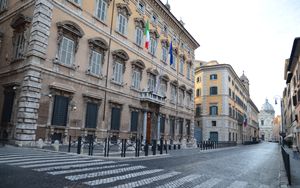(Finance) – The Senate Environment and Industry Committees have given the OK to changes at the tax on extra profits of the banks contained in a government amendment to the asset decree that was approved. The main changes concern the exclusion from basic taxable of the interest margin tax on government bonds e the possibility for banks to choose between payment of the tax or the destination to non-distributable reserve of an amount equal to two and a half times the tax.
In particular, the contribution extraordinary is equal to 40% applied to the amount of the interest margin included in item 30 of the income statement, drawn up according to the formats approved by the Bank of Italy, relating to the financial year prior to the one in progress on 1 January 2024 which exceeds by at least 10 percent of the same margin in the financial year prior to the one in progress on January 1, 2022.
There dispositionFurthermore, it remodulates the maximum amount of theextraordinary tax that the individual institution can pay, no longer commensurate with 0.1% of the assets but with 0.26% of the weighted assets relating to the financial year prior to the one in progress on January 1, 2023. The banks, we read further in theamendmentinstead of paying the tax, “can allocate, when approving the budget relating to the financial year prior to the one in progress as of January 1, 2024, an amount equal to two and a half times the tax to a non-distributable reserve”.
This reservation, the amendment continues, “respects the conditions of EU Regulation n.575/2013 for its computability among the elements of primary class 1 capital”. If the reserve is used for the distribution of profits, the tax is paid within thirty days of the approval of the relevant resolution, with an increase proportionate to the interest accrued. L The amendment also provides for the prohibition on transferring the burdens of the extraordinary tax onto the costs of services provided to businesses and end customers.Competition and market authority will monitor the timely compliance with the provision.
News also on the rules against Dear flights. In fact, in an amendment the government replaced the outright ban on application rates aerial “200 percent higher than the average flight fare” on connections with islands with greater intervention power of the Antitrust on airline pricing policies.
In particular, the amendment establishes that the Antitrust can activate when the conducted of the companies lead “to a selling price of the ticket or ancillary services, in the last week before the flight, higher than rate average of the flight by over 200%”. The rewriting of the provisions against high flight costs compared to those included in the decree approved by the Council of Ministers would have been dictated by the need to make the rule more coherent with the framework of the community legislation on competition. The ban on the use of automated procedures for determining rates based on user web profiling activities or on the type of electronic devices used for bookings has been confirmed.
